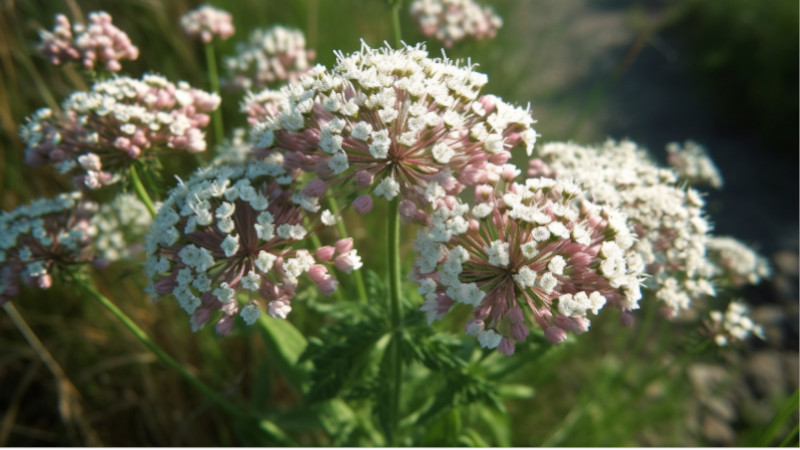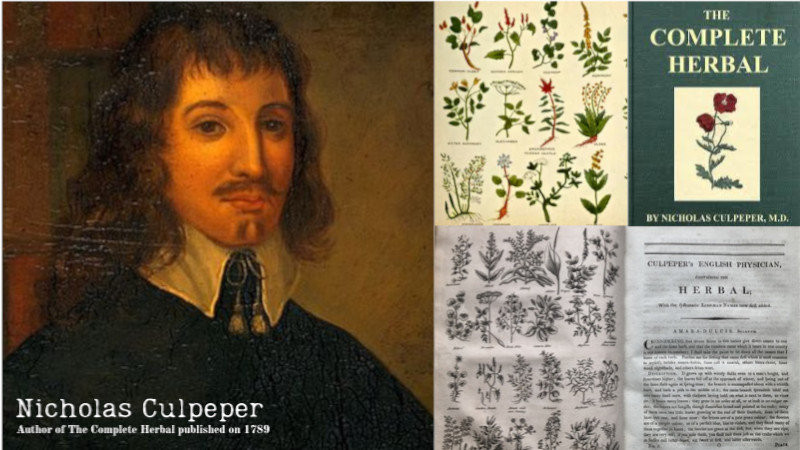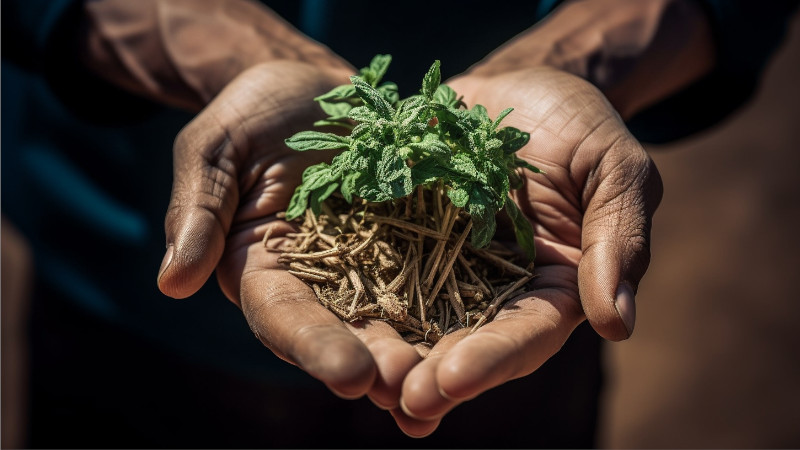For centuries, natural remedies have found their way into the tapestry of human wellness, and two herbal wonders, which we will look at closely in our Valerian root vs Ashwagandha comparison, have timelessly held their ground.
Valerian root is native to Europe and parts of Asia, and is renowned for its tranquillising qualities, often serving as nature’s answer to restless nights. On the other hand, Ashwagandha has proven to be a cornerstone of Ayurvedic medicine and is known for its ability to balance, rejuvenate, and invigorate.
But what other secrets do these herbal wonders hold?
What other ancient wisdom can we learn of when we examine Valerian Roots vs Ashwagandha’s storied pasts?
Journey with us as we delve deeper into these two, uncovering three ancient secrets that might just reshape your understanding of these potent herbs. Prepare to be enlightened!
Table of Contents
A Comparative Analysis: Valerian Root vs Ashwagandha
Valerian Root or Ashwagandha for Anxiety:
Valerian Root is a plant historically renowned for its calming properties and has been the subject of interest, particularly for its potential to treat anxiety.
It contains compounds understood to soothe the central nervous system by way of its biochemical mechanisms. Some of the ways it might function to alleviate anxiety are believed to include:
- Gamma-Aminobutyric Acid (GABA)
- Valerian root is thought to increase levels of GABA, a neurotransmitter in the brain. GABA plays a pivotal role in reducing neuronal excitability throughout the nervous system and, consequently, is believed to help in lowering anxiety and stress levels. 1
- Lignans and Valerenic Acid
- These compounds present in Valerian root can help regulate mood by potentially increasing levels of other neurotransmitters like serotonin and adenosine. These neurotransmitters are known to impact mood stabilisation and, thus, may offer relief from anxiety. 2

While Valerian root contains compounds that have a calming effect on the nervous system, it is essential to note that empirical evidence on its efficacy in treating anxiety is still debated among Researchers.
However, its history of use, and the known calming compounds it contains provide a rationale for its application in alleviating anxiety symptoms.
Ashwagandha, on the other hand, has been traditionally used to manage stress and enhance well-being.
An investigation into the stress-relieving and pharmacological actions of Ashwagandha extract suggests that adults who consumed it demonstrated a marked reduction in anxiety levels when measured using specific rating scales like the Hamilton Anxiety Rating Scale (HAM-A). 3
Ashwagandha’s biochemical mechanisms on how it might function to alleviate anxiety are understood to include:
- HPA Axis Modulation
- It potentially alleviates anxiety by modulating the activity of the hypothalamus-pituitary-adrenal (HPA) axis. The HPA axis is crucial in governing the body’s stress response. Imbalances in the HPA axis are linked to stress-related disorders, including anxiety. Ashwagandha appears to restore this balance, thus ameliorating anxiety symptoms.
- Reduction in Cortisol Levels
- Chronic stress is often correlated with elevated cortisol levels. Ashwagandha supplementation has been associated with reductions in morning cortisol levels, pointing towards its stress-relieving properties. 4
- Neuroprotection
- Ashwagandha has been discovered to possess properties that protect the nervous system. Potentially, these may support the promotion of the health of neurons and aid in combatting the effects of stress on the brain.5
Valerian root may reduce anxiety by influencing the GABA receptors in the brain, promoting calmness. While Ashwagandha targets anxiety by affecting the HPA axis, potentially decreasing cortisol levels, the stress hormone.
Comparatively, Ashwagandha’s approach seems more comprehensive, addressing both physiological and neurological facets of anxiety. While some studies support Ashwagandha’s efficacy, individual reactions can differ.
Ashwagandha’s broader approach may appear superior, but Valerian’s effect on GABA might be better for some.
Valerian Root vs Ashwagandha; Which is Better for Sleep and Fighting Insomnia?
In addition to their anxiety-alleviating properties, both Valerian root and Ashwagandha have been recognised for promoting sleep.
| Valerian Root | It promotes sleep by increasing the levels of a neurotransmitter called gamma-aminobutyric acid (GABA) in the brain. GABA serves to calm the central nervous system, alleviating anxiety and encouraging a relaxed state. The compounds in valerian root, such as valerenic acid, interact with GABA receptors, leading to a sedative effect. As a result, valerian root can help individuals fall asleep faster and experience improved sleep quality. |
| Ashwagandha | Ashwagandha root extract has been shown to effectively improve sleep quality and onset latency in both healthy individuals and those with insomnia. Its natural compounds have sleep-inducing potential, which can be particularly beneficial for those suffering from anxiety-related sleep disturbances. The interesting results of a double-blind, randomised, placebo-controlled study demonstrated its efficacy in enhancing sleep parameters, making it a potential alternative to traditional sleep medications. 6 |
Building on the natural sleep-promoting benefits of Valerian root and Ashwagandha, it’s crucial to understand the broader implications of sleep on our well-being.
We take a closer look at the relationship between sleep and wellbeing where we delve into the question ‘How does lack of sleep affect mental health?’ Come with us and discover actionable tips and insights to ensure a restful night and a healthier mind.
What does Valerian Root do to your body?
Valerian Root’s Effects of its Chemical Composition
Valerian root contains a variety of chemical compounds that contribute to its medicinal properties. Here are the primary chemical compositions of valerian root and their associated effects:
- Sesquiterpenes of the Volatile Oil including Valeric Acid
- These are responsible for most of the valerian’s biological effects. They have direct sedative effects and can interact with neurotransmitters such as GABA. 7
- Iridoids (Valepotriates)
- Iridoids present in valerian root could have anti-inflammatory properties and may suppress the activity of certain genes. 8
- Free Amino Acids
- Gamma-Aminobutyric Acid (GABA) – GABA is an inhibitory neurotransmitter in the brain. Valerian’s sedative effects may be partly due to its influence on GABA levels or activity.
- Tyrosine, Arginine, and Glutamine – These amino acids are present in valerian, but their specific roles in the herb’s effects are not clearly defined.
Possible Side Effects of Valerian Root
Typically, consuming valerian root supplements is believed to cause mild side effects compared to sedative or hypnotic sleep medications.
While many research causes mild side effects on sleep indicate that participants either faced no side effects or only mild ones similar to placebo groups, some studies have noted that certain individuals might experience specific mild side effects such as: 9
- Headache
- Upset stomach
- Mental dullness
- Excitability
- Uneasiness, and
- Heart disturbances
Hence, seeking advice from a suitably qualified specialist is key before making this a part of your routine.
Want to know more about what’s valerian root good for? We’ve got you covered. Explore the myriad of health advantages this remarkable herb offers.
Available Forms of Valerian Root
Below are the available forms of valerian root that you can purchase in a store and make at home.
| Available in: | |
| Powdered valerian root | capsule and tablet |
| Powdered valerian root | tea |
| Valerian fluid extracts and tinctures | alcohol, or alcohol-free bases |
Speaking of tea, discover the soothing and rejuvenating experience of our HerbiTea, the perfect blend for those seeking a natural escape in every sip.
Valerian Root Tea in the Evening: Potential Side Effects
Taking valerian root at night might lead to increased sleepiness the following morning, which can affect daily activities and cognitive functions.
Additionally, when valerian root is combined with other sedative substances like alcohol or sedative drugs, there’s a high risk of excessive sedation or drowsiness. This combined effect can be dangerous, especially when driving or operating machinery, and can also increase the side effects of both substances.
3 Historical Uses of Valerian Root:
Valerian root, with its deep-rooted history, has been a cornerstone in traditional medicine for centuries. Known for its therapeutic properties, ancient civilisations turned to this herb for a myriad of ailments. Now, let’s delve into the valerian root’s 3 ancient secrets of historical uses.
- In the 16th century, it was used to treat trembling, nervousness, heart palpitations and headaches. 10
- In the mid-19th century, an English Physician, Nicholas Culpeper, published a book called Complete Herbal in 1789, which mentioned the uses of valerian root for various medicinal purposes including: 11
| Boiled with licorice and raisins | – can treat coughs – can eliminate phlegm |
| Boiled in wine | – treats bites or stings from venomous animals |
| Applied as a drop in the eye | – improves vision clarity – relieve eye pain |
| Valerian root (not mentioned how it was done) | – treats both internal and external wounds – removes splinters or thorns from the skin |
3. During World War II in the United Kingdom, people consumed valerian root to alleviate the stress induced by air raids. 12

The Ayurvedic Marvel: Ashwagandha
3 Historical Uses of Ashwagandha in Ayurveda:
Ashwagandha is a component of Rasayana, a part of Ayurveda focused on promoting longevity, enhancing intellectual faculties, and preserving youthful vitality.
Its historical roots can be traced back to the Vedas, a collection of Hindu religious texts dating as far back as 6000 BCE. The root of Ashwagandha was described as having utility in addressing various ailments such as: 13
- Promotes youth and longevity 14
- Strengthens bone marrow, muscle, and semen, and 15
- Assists with neurological disorders, and alleviates suffering 16
Ashwagandha in the Evening: Potential Side Effects
Ashwagandha is known to contain compounds that may increase alertness and energy levels. Taking it in the evening may lead to difficulty falling asleep or disrupted sleep patterns in some people. Yet, the impact of these effects may differ for each individual.
It’s essential to note that individual responses to supplements like Ashwagandha can differ, and while some may experience alertness, others may not be affected significantly. Therefore, it’s advisable to consider taking Ashwagandha earlier in the day or as recommended by a healthcare professional to avoid potential sleep disturbances.
FAQs
Can I take Ashwagandha and Valerian Root together?
Yes, Ashwagandha and Valerian Root can be taken together. However, it’s essential to consult with a healthcare professional before combining them to ensure safety and proper dosage.
Does Ashwagandha induce sleepiness or boost your energy?
Ashwagandha is primarily known for its adaptogenic properties, meaning it helps the body manage stress. For some individuals, it can induce a calming effect, potentially leading to better sleep.
For others, it may help improve energy and stamina by reducing fatigue and enhancing resilience to stress. The effect can vary based on the individual and the specific formulation or dosage used. Always consult with a healthcare professional to determine its appropriateness for your specific needs.
Why do I wake up tired after taking Ashwagandha?
Taking Ashwagandha can sometimes lead to feeling tired upon waking due to its sedative properties. This herb impacts the central nervous system and can deepen sleep, which might result in a groggy feeling upon waking, especially if taken in high doses or if your body is still adjusting to its effects.
What is the strongest herb for sleep?
Valerian root is often considered the strongest herb for promoting sleep due to its sedative properties and its ability to improve sleep quality and reduce the time it takes to fall asleep.
Does Valerian Root make you sleepy or give you energy?
Valerian Root is primarily known to promote relaxation and help induce sleep, rather than providing energy.
Why do I wake up tired after taking Valerian root?
Waking up tired after taking Valerian root might be due to its sedative properties, which can cause drowsiness in some people. The effect can vary based on the dosage taken and individual reactions to the herb. We recommend always consult with a healthcare professional about appropriate dosages and potential interactions.
Conclusion
In the timeless journey of natural remedies, Valerian Root and Ashwagandha stand out as two remarkable herbal wonders. Both have carved their niche in traditional medicine, offering relief from anxiety and promoting a serene sleep.
As we’ve uncovered their three ancient secrets, we’ve seen that while they have different mechanisms of action, their end goal is similar. Choosing between them isn’t about deciding which is superior, but rather, which aligns best with your unique needs.
As you contemplate these age-old remedies, remember that the best choice is informed by both ancient wisdom and personal experience. Embrace their legacy and find the calm you seek.
Join the Valerian root vs Ashwagandha conversation and share your thoughts with us on Instagram and Pinterest!
References
- “Valeriana officinalis root extracts have potent anxiolytic effects in laboratory rats” – K. Murphy, Z. Kubin, J. Shepherd, R. Ettinger, 29 December 2009 [Science Direct] [Archive] ↩︎
- “Valerian Root in Treating Sleep Problems and Associated Disorders—A Systematic Review and Meta-Analysis” – N. Shinjyo, G. Waddell, J. Green, 21 October 2020 [PubMed Central] [Archive] ↩︎
- “An investigation into the stress-relieving and pharmacological actions of an ashwagandha (Withania somnifera) extract” – A. Lopresti, S. Smith, H. Malvi, R. Kodgule, 13 September 2019 [PubMed Central] [Archive] ↩︎
- “Adaptogenic and Anxiolytic Effects of Ashwagandha Root Extract in Healthy Adults: A Double-blind, Randomized, Placebo-controlled Clinical Study” – J. Salve, S. Pate, K. Debnath, D. Langade, 25 December 2019 [PubMed Central] [Archive] ↩︎
- “What are the benefits of ashwagandha?” – R. Goldman, Last checked 19 September 2019 [Medical News Today] [Archive] ↩︎
- “Efficacy and Safety of Ashwagandha (Withania somnifera) Root Extract in Insomnia and Anxiety: A Double-blind, Randomized, Placebo-controlled Study” – D. Langade, S. Kanchi, J. Salve, K. Debnath, D. Ambegaokar, 28 September 2019 [PubMed Central] [Archive] ↩︎
- “Valerian” – S. Hadley, J. Petry, 15 April 2003 [American Family Physician] [Archive] ↩︎
- “Valerian Root for Sleep” – J. Summer, Last checked 19 September 2023 [Sleep Foundation] [Archive] ↩︎
- “Valerian” – NCCIH Staff, Last checked 19 September 2023 [National Center for Complementary and Integrative Health] [Archive] ↩︎
- “Valerian” – NIH Staff, Date [National Institutes of Health] [Archive] ↩︎
- “Roots of Medicine: Valerian” – IOWA Staff, Last checked 19 September 2023 [IOWA Library] [Archive] ↩︎
- “Health Benefits of Valerian Root” – WebMD Editorial Contributors, Last checked 19 September 2023 [Web MD] [Archive] ↩︎
- “Ashwagandha: The Rising Star of Ayurveda, optimized for beverages and food” – Givaudan Staff, Last checked 19 September 2023 [Givaudan] [Archive] ↩︎
- “Efficacy and Tolerability of Ashwagandha Root Extract in the Elderly for Improvement of General Well-being and Sleep: A Prospective, Randomized, Double-blind, Placebo-controlled Study” – S. Kelgane, J. Salve, P. Sampara, K. Debnath, 23 February 2020 [PubMed Central] [Archive] ↩︎
- “Clinical Evaluation of the Spermatogenic Activity of the Root Extract of Ashwagandha (Withania somnifera) in Oligospermic Males: A Pilot Study” – V. Ambiye, D. Langade, S. Dongre, P. Aptikar, M. Kulkarni, A. Dongre, 28 November 2013 [PubMed Central] [Archive] ↩︎
- “Handbook of Medicinal Herbs” Second Edition, J. A Duke, M. J. Bogenschutz-Godwin, J. DuCellier, P. K. Duke, 2002 [CRC Press] [Archive] ↩︎
Last Updated on 5 months by D&C Editorial Team




